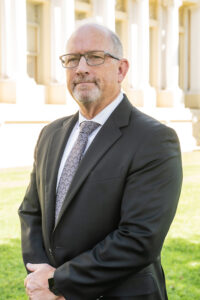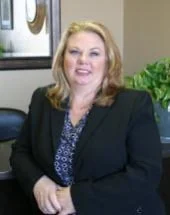Best Family Lawyer in San Bernardino County, CA
Amy York Garrett
Family Lawyer
Attorney Amy York Garrett has been providing compassionate guidance to each and every one of her clients since 1989. Her experience in Family Law, Adoption Law and Probate Law and personalized services are her office’s greatest assets.
At the Law Office of Attorney Amy York Garrett, realizes that clients depend on the attorney’s experience, knowledge and professional approach to help guide them through their legal matters. Attorney Amy Garrett believes in direct personal communication and works to develop a close professional relationship with every client to understand all aspects of the case.
Attorney Amy Garrett has an extremely friendly and caring staff that is client-focused and knowledgeable about each client’s case. Her fees are fair and reasonable and customized to each client’s particular circumstances and case needs.
Attorney Amy Garrett speaks fluent Spanish.
EDUCATION:
|
Derek L. Austin
Family Lawyer
Derek is a California Certified Family Law Specialist. He did his undergraduate education at the University of California at San Diego and received his law degree from Santa Clara University. He is native to San Jose and attended Independence High School.
Early in his legal career, Derek appeared and prevailed before the 1st District, California Court of Appeal (Published Opinion 161 Cal.App.4th 809). Thereafter, he focused his practice mainly on family law. In 2010, Derek started his own practice after leaving a regional law firm in San Jose. Derek’s solo practice focused exclusively on family and criminal law.
In 2017, Derek merged his practice with Schank & Associates. Since that time, Derek has assisted Mr. Schank with managing and building his firm’s family law presence in 5 of the major Northern California counties [Santa Clara, Santa Cruz, San Mateo, Alameda, and Contra Costa]. Derek is known for his straightforward, practical approach to problem-solving. However, Derek is a trial attorney at his core, and litigation strategy is his strength. His trial-first approach and preparation position his clients to achieve favorable results prior to trial.
Derek is passionate about his family, friends, community, and work ethic. He loves all sports and especially watching his two boys play baseball, football, basketball, and volleyball. Married to his amazing wife since 2000, Derek takes every opportunity to spend his free time with her and his kids.
Stacy Augustine, Esq.
Family Lawyer
Mr. Augustine is a talented lawyer who has helped clients recover millions of dollars for their injuries and gain child custody justice. His legal experience spans over 15 years as he previously owned a paralegal business. Though licensed as an attorney in 2018, he has tried many cases and has jury trial experience. He is also a certified child dependency lawyer. He has a passion for advocacy and aims to develop a strong attorney-client relationships. His goal is to be the best client-focused attorney he can be and help those in need obtain justice.
Mr. Augustine is a life-long Inland Empire resident where he resides with his wife, Marnesha, and their six children. He has strong community ties, attending Etiwanda High School, Rialto High School, and graduating from Riverside Community College. He also is the head coach and director of Chosen Youth Basketball (CYB) and co-founder of the Augustine Family Education Hub.
Education History:
JURIS DOCTOR, Taft Law School
ASSOCIATE OF ARTS, Riverside Community College
Professional Licenses:
CALIFORNIA STATE BAR, Attorney at Law (SBN: 320475)
Jess Franco
Family Lawyer
Case Manager for Family, Juvenile Dependency, and Civil Cases
- B.A., Communications, Cal State University, San Bernardino
- Certified chef
- Dog mom
At The Law Office of Vincent Hughes, we stand with you every step of the way. We offer the competent and diligent representation you deserve and ensure you understand what to expect in the process and the most likely results in your legal issue.
Shauna M. Albright
Family Lawyer
Shauna M. Albright is the Founding and Managing Partner of Albright Family Law Group. For the past 20 years, she and her team have helped thousands of clients navigate through divorce, child custody, support, property division and other aspects of Family Law. She prides herself in providing her clients that small firm attention with that big firm expertise.
Ms. Albright is the author of, “Child Custody & Visitation in California: Preparing for the Battle Ahead and Strategies for Winning the War.” She is also the host of the upcoming podcast, “The Divorce Cafe” which will launch in September 2022. In her podcast, Ms. Albright will offer legal guidance on divorce and child custody issues while tackling the raw emotions people experience when going through a divorce.
As a resident of Riverside County for over 35 years, Ms. Albright’s law firm prides itself in representing clients from Riverside County including the Temecula and Murrietta area as well as San Bernardino County. She is a board member of the Riverside Community College District Foundation since 2020 and a past president of the Richard T. Fields Bar Association Foundation. Both foundations are dedicated to raising monies for scholarships to assist students in their education. Shauna is proud to sponsor other community events over the years to help local youth and education programs.
E. Steve Najera
Family Lawyer
- ead counsel on all family law matters.
- Lead counsel on all criminal matters.
- Conduct professional research on the law, analyze the facts of each unique case, and prepare motions to file with the court and argue.
- Attend Continuing Legal Education to stay updated with recent changes in the law.
- Represent clients at Domestic Violence Restraining Order hearings.
- Represented clients in both misdemeanor and felony matters. Conducted professional research and analyzed and evaluated the facts to prepare a defense strategy.
- Trained legal interns, ensuring that all policies and procedures were fully followed.
- Represented parents in Dependency court, where I advocated to maintain parental rights intact and reunify families.
- Recognized with the distinguished Don Simm’s Trial Attorney of the Year award.
Mark Reel Jr.
Family Lawyer
Mark is the CEO and Managing Attorney at Reel Fathers Rights APC. He is licensed to practice law in California. Prior to founding Reel Fathers Rights APC, Mark spent more than a decade in the sports and fitness industries working as a scout, agent, event promoter, and operator, but pivoted back to family law after going through his own family court struggle.
Since founding Reel Fathers Rights, Mark has quickly developed the reputation nationally for his work and advocacy for fathers. He hosted a weekly live show for the Fathers Rights Movement previously called STATE of the FAMILY COURTS with Mark Reel Jr. He is also the author of the book, The Fathers Rights Playbook.
Locally he has developed a reputation as one of the most well-known and fierce advocates in Southern California. Working out of the Corona Office, Mark has represented men in Divorce, Child Custody, Child Support, and Domestic Violence matters throughout Southern California. He has appeared in courthouses throughout the state including courthouses in Riverside, Hemet, San Bernardino, Barstow, Orange, Vista, Pomona, Long Beach, Los Angeles, Chatsworth, Heyward and Modesto.
His practice focuses exclusively on Family Law, limited exclusively to Divorce, Child Custody, Child Support and Domestic Violence.
Mark is a father of 5-year old twins, Bryson and Bella.
You can listen to Mark on his weekly podcast, “The Fathers Rights Playbook” anywhere podcasts are available.
Stacy Albelais
Family Lawyer
I am attorney Stacy Albelais. I began working as a family law paralegal in 1998. I then went to law school and have been a practicing family law attorney since 2008. I have dedicated my practice to family law, providing exceptional service in a wide range of case levels from high-conflict, high-asset to amicable uncontested dissolutions and paternity matters.
Practice Areas:
- Family Law
- Child Support
- Custody & Visitation
- Divorce
- Domestic Violence & Neglect
- Adoptions & Guardianship Issues
- Property Distribution
- Restraining Orders
- Legal Separation
- Paternity
- Fathers’ Rights
- Prenuptial Agreements
- Same Sex Family Law
- Juvenile Dependency
- Grandparents Rights
- Spousal Support
Why Legal Documents Take Time to Process: A Guide to Understanding the Court System
Legal documents, whether related to civil matters like divorces or criminal cases, often take time to process. While this delay can be frustrating for those involved, there are several reasons why the court system operates at a slower pace than most people expect. This guide explains why legal documents take time to process and provides insight into the court system.
1. High Volume of Cases
One of the most significant factors contributing to delays in processing legal documents is the sheer volume of cases that courts handle daily. Courts often deal with a wide variety of cases, including criminal, civil, family, and administrative law matters. Each case involves its own set of documents that need to be processed, reviewed, and filed by the court staff. The larger the backlog, the longer it takes to process each individual case.
2. Multiple Steps in Processing
Legal document processing is not a simple, one-step procedure. It involves multiple stages, such as:
- Filing: Documents are initially submitted to the court, where they are checked for completeness and accuracy.
- Review by Court Clerks: Court clerks review the documents to ensure they meet legal standards, are filed correctly, and include the necessary information.
- Judge’s Review: In some cases, a judge must review the documents to make rulings or issue orders. Depending on the court’s caseload, this review may take time. Each of these stages can introduce delays if errors are found or additional information is needed.
3. Complexity of the Case
The complexity of a legal case also plays a role in how long it takes for documents to be processed. Simple cases, such as uncontested divorces or routine motions, may move more quickly through the system. However, more complex cases—like those involving multiple parties, disputes over large sums of money, or detailed legal arguments—require thorough review and scrutiny. These cases often necessitate longer wait times for document processing as they require more attention from court staff and judges.
4. Court Schedules and Availability
Judges and court staff have tight schedules. They must balance hearings, trials, and the review of legal documents. Courts are also bound by procedural rules and timelines that dictate when certain actions must occur. Additionally, judges may need to set aside time to carefully review certain documents, such as legal briefs, motions, or orders. Given these competing demands, legal documents may take time to be processed as judges prioritize urgent or time-sensitive cases.
5. Legal Deadlines and Notice Periods
Many legal actions involve specific deadlines and notice periods. For example, parties involved in a lawsuit must be given adequate time to respond to legal documents before the court can proceed. These deadlines, often ranging from weeks to months, are built into the legal system to ensure fairness. The necessity to meet these legal timeframes inevitably slows down the overall process.
6. Accuracy and Legal Compliance
Legal documents must comply with numerous rules and regulations. Whether it’s filing a motion, submitting a legal brief, or preparing a court order, there are strict guidelines that must be followed to ensure legal validity. These documents undergo rigorous reviews for accuracy, clarity, and adherence to court rules. If errors are discovered, such as incorrect information or missing signatures, the documents may need to be refiled, causing further delays.
7. Mediation and Negotiation Processes
In cases like divorces, personal injury claims, or business disputes, parties are often encouraged or required to pursue mediation or negotiation before going to trial. These processes can take time, as both parties attempt to reach an agreement outside of the courtroom. While mediation can ultimately save time by avoiding a lengthy trial, it can also add to the delay in processing final legal documents if settlement discussions drag on.
8. Holidays and Court Closures
Court systems operate according to their jurisdictions’ holiday schedules and may close during certain times of the year, such as national holidays or vacation periods. Additionally, courts may experience delays during busy periods, such as year-end. These closures or reduced operating times can slow down the document processing timeline.
9. Human Resources Limitations
Court systems are often limited by the availability of personnel, including clerks, judges, and administrative staff. With limited resources, it can take longer for documents to be filed, reviewed, and processed. Many courts have adopted electronic filing systems to improve efficiency, but even with technology, human oversight is still required to ensure everything is in order.
10. Appeals and Challenges
If one party in a legal case chooses to appeal a decision or challenge a ruling, it can significantly extend the processing time for legal documents. Appeals involve a separate court process, which means additional filings, reviews, and legal procedures. This process can prolong the final resolution of the case and the completion of the associated documentation.
Conclusion
Legal documents take time to process due to a combination of high case volumes, procedural requirements, case complexity, and limited court resources. While it may seem like an unnecessarily slow process, these delays help ensure that each case is handled fairly, accurately, and according to the law. Patience is crucial, and understanding the factors that contribute to these delays can help individuals navigate the legal system with more realistic expectations. Consulting with a lawyer can also provide insight into how long specific documents may take and what steps can be taken to expedite the process.











